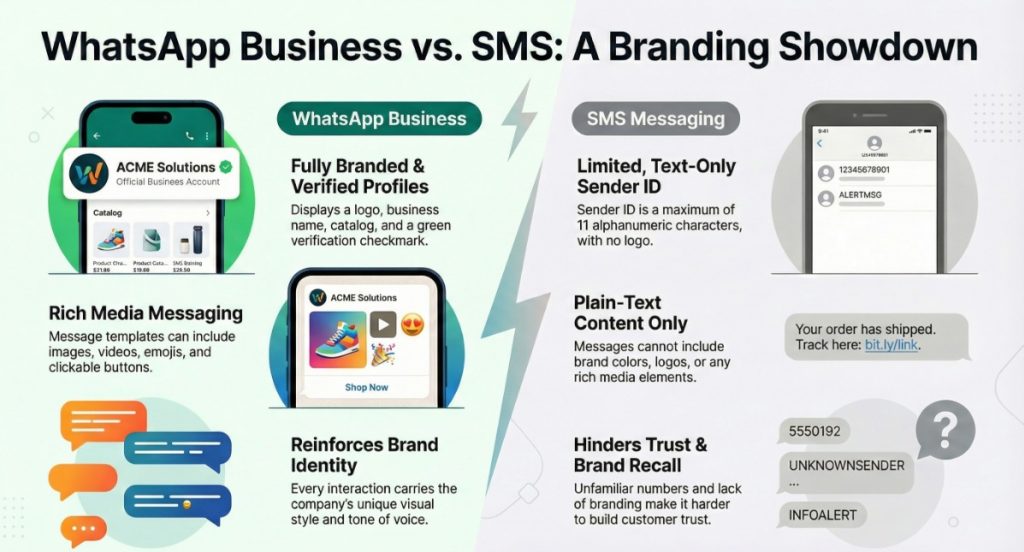Choosing the right channel for customer communication isn’t just about reaching them—it’s about connecting effectively and efficiently. Businesses often face a critical choice: the universal reach of SMS or the rich, interactive experience of WhatsApp? While both are powerful, using them correctly is the key to maximizing engagement and ROI.
WhatsApp, after its launch in 2009, has grown rapidly across the world. It’s grown at an average pace of 30.5% annually in India over the last 5 years. Despite this rapid rise of WhatsApp, SMS continues to be the largest channel for customer communications in India. SMS can reach every mobile number, while WhatsApp enables richer engagement and two-way conversations. For marketing and service, businesses should use WhatsApp first, with SMS as a backup when data is low or numbers are on DND. WhatsApp’s read receipts and buttons improve click-throughs, while SMS remains the fastest option for OTPs and urgent alerts. The right approach is not choosing one over the other, but using both in coordination.
This article seeks to re-iterate the reasons to strike a balance between SMS and WhatsApp for enterprise customer communications.
SMS vs WhatsApp: Core Features and Business Impact

Ubiquity
WhatsApp, first introduced in 2009, is now available in 60 languages across 180+ countries. It has over 2 billion users who spend roughly 195 minutes per week on the platform. To use this application, a user requires a basic smartphone.
SMS was first introduced in the early 1990s. It was designed to run on basic feature phones. As a result, with 5.1 billion users, it reaches almost 67% of the global population. While facing competition from the feature-rich WhatsApp and other similar messaging apps, SMS remains a requisite channel for business communication, especially to ensure inclusivity.
Times Mobile offers both WhatsApp for Business (WABA) and SMS platforms and accompanying APIs to enterprises to integrate these channels into their key business applications and processes.
Features
SMS is limited to 160 characters per message, whereas WhatsApp can deliver up to 4096 characters per message. SMS can only deliver text messages (although most SMS reading apps today recognize simple features such as a clickable URL). In contrast, a WhatsApp message can contain images, videos, carousels and interactive buttons in addition to text.
A2P SMS in India is limited to one-way communication. WhatsApp facilitates interactive, two-way communication. Times Mobile’s WhatsApp for Business platform enables two-way communication with chatbots as well as live agents in a seamless manner.
It’s also worth noting the evolution of SMS into RCS (Rich Communication Services), which bridges this gap. RCS adds app-like features to the Messages app on Android, such as rich cards, carousels, verified sender, and read receipts. In India, most private operators already support RCS, and Apple has started a small Jio-only pilot for iPhone, though wider iOS support is still limited. Our advice: test RCS with Android-heavy audiences where branding and rich replies matter, use SMS as a fallback, and keep WhatsApp for high-intent conversations and service.
As a forward-thinking partner, Times Mobile is equipped to guide businesses through this evolving landscape, ensuring your communication strategy is always ahead of the curve.
Branding
WhatsApp for Business lets companies present a fully branded storefront inside the chat list. An official profile shows the business name (instead of a phone number), a logo, catalog, description, and operating hours, and, once verified by Meta, the coveted green check mark that signals authenticity. Message templates can include imagery, video, emojis, and clickable buttons, so every interaction carries the brand’s visual identity and tone of voice.

Conventional SMS, by contrast, permits only an alphanumeric sender ID of up to 11 characters and plain-text content. There is no logo, brand colour, or verification badge, so messages often appear to arrive from an unfamiliar number. This limitation makes trust-building harder, lowers recall, and forces marketers to rely solely on copy to convey brand personality.
Times Mobile simplifies brand-safe messaging across both channels. It provisions verified business profiles on WhatsApp, designs media-rich templates that meet Meta’s guidelines, and integrates product catalogues so each outbound or conversational message reinforces the brand. For SMS, it helps configure consistent sender IDs and branded short-links, ensuring even text-only campaigns carry a clear, recognisable identity.
Personalization
WhatsApp Business makes it easy to send messages that feel personal. You can drop in each customer’s name, refer to their last order, or even mention their city, then add photos, videos, or quick-reply buttons so the chat feels like a one-to-one conversation. Automated flows can change what a person sees based on what they click or the stage they’re at. Whether it’s a welcome note, a “your package is on the way” update, or a gentle nudge to leave feedback.
SMS doesn’t offer the same flexibility. You can usually merge in a first name, maybe an order number, but that’s about it. Every text is plain and static, so customers can’t tap a button, browse a catalog, or see dynamic content. Because the experience is identical for everyone, it’s harder to make recipients feel the message was written just for them.
Cost-Effective
WhatsApp for Business follows a data-based pricing model. After a 24-hour customer care window, businesses pay per conversation, not per individual message, and the rate is generally a fraction of a cent when delivered over mobile data or Wi-Fi. Rich media images, documents, and location pins travel at no extra charge beyond the standard conversation fee. For customers, receiving and replying on WhatsApp also remains free, eliminating resistance to ongoing dialogue.
SMS is billed on a per-message basis and, in many markets, incurs higher tariffs for images, international delivery, or messages that exceed 160 characters (which are split and charged as multiples). Regulatory surcharges such as India’s DLT fees or U.S. carrier pass-through costs further add to the total. Because each outbound or inbound text triggers a separate charge, large-scale two-way campaigns can become expensive quickly.
Performance and Tracking
Enterprises want their customer communications to be read. Both SMS and WhatsApp perform well on message opens with 90% and 98% of messages being opened, respectively.
Enterprises also want their customer communications to be engaged with. Given the text-only nature of SMS, its click-through rate is anywhere between 1-6%. WhatsApp on the other hand, scores well here, with a click-through rate of around 40%. This is unsurprising since WhatsApp offers the ability to use media, whereas SMS is limited to static text.
Both offer the ability to track the delivery of the message. However, WhatsApp offers the ability to track read receipts as well, which SMS does not. WhatsApp also can track clicks. SMS doesn’t have a native click-tracking ability. Times Mobile, however, offers a comprehensive URL tracking capability for its A2P SMS solution. In addition, for enterprises using our click trackers, we also give a map of the enterprise’s audience against TIL’s audience segments.
For campaigns that demand clicks and replies, WhatsApp consistently outperforms SMS thanks to media, buttons, and list menus. We instrument UTMs and webhook events on WhatsApp and branded short-links on SMS, then unify reporting so your team evaluates delivery → read → click → conversion cleanly across channels.
Security Measures
WhatsApp emphasizes strong security with end-to-end encryption. Messages are scrambled on the sender’s device and can only be decrypted by the recipient’s device. In addition, WhatsApp offers features like two-step verification and screen lock to enhance security.
SMS lacks in-built encryption. Messages travel in plain text, making them vulnerable to interception by anyone with access to the network infrastructure. However, Times Mobile works with telecom operators that implement significant security measures to secure SMS.
SMS in India requires DLT registration of your Entity, Headers, and Templates as per TRAI rules, and any non-compliant messages get blocked. You must also respect DND and use transactional routes for critical alerts. WhatsApp needs explicit opt-in from users, captured through your web, app, IVR, or CTWA, and we maintain opt-out hygiene and template quality to protect sender trust. Under India’s DPDP Act, both SMS and WhatsApp need clear consent and purpose limitation.
Furthermore, at Times Mobile, we elevate this security baseline. As a SOC2-certified platform, we ensure that every interaction, whether on WhatsApp or SMS, is handled within a framework of rigorous security and data protection protocols, giving you and your customers complete peace of mind.
Commercials
SMS pricing in India is in the range of ₹0.12-0.15 per message, and WhatsApp for Business pricing today is in the range of ₹0.35-0.75 per 24-hour session, depending on the application (utility/service or marketing respectively).
WhatsApp Business (WABA) in India now follows per-message pricing: ₹0.78 for marketing, ₹0.11 for utility, ₹0.12 for domestic authentication, and ₹2.30 for international authentication (from an India WABA). Customer-initiated replies are free within 24 hours, and ads, QR codes, or website entry points give 72 hours of free conversations. High-volume utility and authentication messages also get tiered discounts.
SMS (domestic A2P) is still priced per message. At scale, enterprise rates are usually ₹0.14–₹0.20 for promotional and ₹0.12–₹0.16 for transactional, plus DLT charges of ₹0.025 per SMS and 18% GST. The final route rates depend on your message volume and compliance.
Conclusions
We recommend the following use cases based on the differences highlighted above –
- WhatsApp is well suited for customer support as it is a good two-way channel. Also, multiple demographics across languages in India are comfortable chatting on it. Times Mobile’s WhatsApp for Business Services can work with you to implement a full solution that integrates chatbots and live agents into an optimal support experience.
- WhatsApp is also well suited for marketing applications given its rich messaging capabilities and high click-through rates. At the commercials and click-through rates illustrated above, the effective cost per click for SMS is around ₹5 whereas for WhatsApp it can be as low as ₹1.9.
- SMS is great for one-way notifications in which there is relatively less interactivity, e.g. delivering OTPs or transactional updates. Times Mobile’s SMS solution can ensure high delivery rates, open rates, and low latency.
Finding Your Perfect Mix
Ultimately, the most powerful strategy isn’t about choosing SMS or WhatsApp—it’s about leveraging the unique strengths of both. The right balance depends entirely on your audience, goals, and specific use cases.
Don’t navigate these choices alone. Contact us today for a personalized consultation. We’ll help you design a secure, cost-effective, and highly engaging communication strategy that drives results.




No responses yet